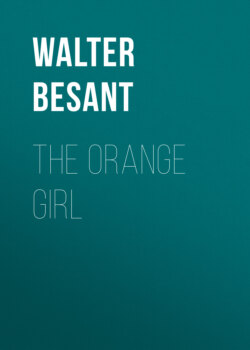Читать книгу The Orange Girl - Walter Besant - Страница 19
На сайте Литреса книга снята с продажи.
WEDDING BELLS AND THE BOOK OF THE PLAY
ОглавлениеTable of Contents
We were married without delay. Why should we wait? I should be no richer for waiting and time would be passing. We were married, therefore. It was impossible from time to time we should not be reminded of the lowly station in which we lived. When one of my cousins was married, what preparations! what feasts arranged and provided! What troops of guests! What a noble company in the Church! What crowds afterwards—the street filled with beggars come for the broken victuals: the butchers with their din unmusical of marrow-bones and cleavers: the band of music playing outside: the acclamation of the crowd when the bride was brought back from church: the rooms full of guests all with wedding favours: the loving-cup passing from hand to hand: the kissing of the bridesmaids: the merriment and coquetry over the bride-cake and the wedding-ring! All this I remembered and it made me sad for a moment. Not for long, for beside me stood a bride sweeter far than was any cousin of mine: and I was a musician; and I was independent.
We walked over the Fields to St. George's Church and were there married at ten o'clock in the morning. Tom gave away his sister: Alice had no bridesmaids: I had no groomsmen: there was no crowd of witnesses: there was no loving-cup. We were married in an empty church, and after marriage we walked home again to Tom's cottage.
He sat down and played a wedding march, of his own composition, made for the occasion. 'There!' he said, 'that is better than a wedding feast—yet there shall be a wedding feast and of the best.'
It was served at noon: there was a duck pie: a pair of soles: a cowslip tart—a very dainty dish: and fried sweetbreads. After dinner there was a bottle of port.
'Will,' said my brother-in-law, taking the last glass in the bottle, 'who would be one of those unhappy creatures who cannot be married without crowds and noise and a great company? Here are we, contented with ourselves: we have been married: we have had a royal banquet—your sweetbreads, wife, were a morsel for a king. You are contented, Will?'
'Quite.' For I was holding Alice by the hand.
'You never regret the flesh-pots?'
'Never—I have forgotten them.' This was not quite true, but it passed.
'I have sometimes thought'—he looked from me to Alice and from Alice to me again—'that there might have been regrets.'
'There can be none, now.'
'Good. Hands upon it, brother. We shall miss Alice, shall we not, wife? But she will not be far off. So.' A tear stood in his eye while he kissed his sister. 'Now,' he said, 'enough of sentiment. The day is before us. I have got a man to take my place to-night and another to take yours. On such an occasion, Will, we must not spare and grudge. We will see the sights of London and then—then—none of your Pleasure Gardens—we will—but I have a surprise for you.'
We sallied forth. Never was a wedding-day kept in so strange a fashion. We took oars at the Falcon Stairs to the Tower. Now Alice had spent all her life in or about the Rules of the King's Bench, but she had never seen London City or the Sights of London. To her everything was new. We showed her the Tower and the wild beasts and the arms and armour and the Royal Crown and Sceptre. After the Tower, we walked along Thames Street where are the Custom House and Billingsgate Market and the Steelyard and the Monument. We climbed up the Monument for the sake of the view: it was a clear day, and we could discern in the distance Lambeth Palace and the Church and perhaps even, one was not sure, the cottage which we had taken on the Bank. After this we went to see the Guildhall and the famous Giants: then the Bank of England and the Royal Exchange: we looked at the shops in Cheapside: they are the richest shops in the world, but the mercers and haberdashers do not put out in the window their costly stuffs to tempt the shoplifter. 'You must imagine, Alice,' I told her, 'the treasures that lie within: some time if we ever become rich you shall come here and buy to your heart's content.' Then we entered St. Paul's, that solemn and magnificent pile: here we heard part of the afternoon service, the boys in their white surplices singing like angels, so that the tears rolled down my girl's face—they were tears of praise and prayer, not of repentance. From St. Paul's we walked up the narrow street called the Old Bailey and saw the outside of Newgate. Now had we known what things we were to do and to suffer in that awful place, I think we should have prayed for death. But Heaven mercifully withholds the future.
